 Advice
books make great gifts-- they are often compact, which makes them more gifty,
they are meaningful, and they are (usually) received with thanks. Viva Editions
has published some very nice and nicely "sized books that are perfect for
presents. Change Your Life! A Little Book
of Big Ideas by Allen Klein ($14.95) is a book to inspire transformation, a
collection of quotations from all sorts of people, not just the usual--Reinhold
Niebuhr, Mary
Advice
books make great gifts-- they are often compact, which makes them more gifty,
they are meaningful, and they are (usually) received with thanks. Viva Editions
has published some very nice and nicely "sized books that are perfect for
presents. Change Your Life! A Little Book
of Big Ideas by Allen Klein ($14.95) is a book to inspire transformation, a
collection of quotations from all sorts of people, not just the usual--Reinhold
Niebuhr, Mary 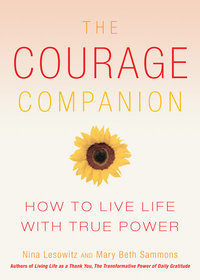 Tyler Moore, Satchel Paige, Bat Masterson, Annie Dillard--arranged
by subjects like "Forget Failure" and "Have Hope, Help Others."
Going a bit deeper is The Courage
Companion: How to Live Life with True Power by Nina Lesowitz and Mary Beth
Sammons ($15.95). The authors write about people who have faced the worst, or
taken a big step without a net, and managed to confront their fears. Each
chapter has three personal stories, a sidebar and a power practice, like five
tips for managing your fears after job loss, or a book recommendation, or a
quotation.
Tyler Moore, Satchel Paige, Bat Masterson, Annie Dillard--arranged
by subjects like "Forget Failure" and "Have Hope, Help Others."
Going a bit deeper is The Courage
Companion: How to Live Life with True Power by Nina Lesowitz and Mary Beth
Sammons ($15.95). The authors write about people who have faced the worst, or
taken a big step without a net, and managed to confront their fears. Each
chapter has three personal stories, a sidebar and a power practice, like five
tips for managing your fears after job loss, or a book recommendation, or a
quotation.
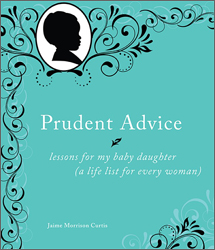 Andrews
McMeel has published a winning book by Jaime Morrison Curtis: Prudent Advice. Curtis has a baby
daughter and started compiling advice for her, which turned into "a life
list for every woman." It's a hardcover, and at $12.99 and 200 pages, it's
tough to beat as a gift suggestion. Of course, the content has to be good, and
is it ever: #163: Learn how to drive a stick shift. #428: Preface a difficult
conversation by acknowledging it. #285: Never park in the handicapped spot. #83:
Sometimes you will feel alone. #203. Return your shopping cart. #222: If love
were enough, no one would ever die. Curtis expands on most of her advice (on
appreciating the weather, she says, "It is one of the few uncontrolled
experiences of nature you will have if you live in the city.") with
wisdom, wit and love.
Andrews
McMeel has published a winning book by Jaime Morrison Curtis: Prudent Advice. Curtis has a baby
daughter and started compiling advice for her, which turned into "a life
list for every woman." It's a hardcover, and at $12.99 and 200 pages, it's
tough to beat as a gift suggestion. Of course, the content has to be good, and
is it ever: #163: Learn how to drive a stick shift. #428: Preface a difficult
conversation by acknowledging it. #285: Never park in the handicapped spot. #83:
Sometimes you will feel alone. #203. Return your shopping cart. #222: If love
were enough, no one would ever die. Curtis expands on most of her advice (on
appreciating the weather, she says, "It is one of the few uncontrolled
experiences of nature you will have if you live in the city.") with
wisdom, wit and love.
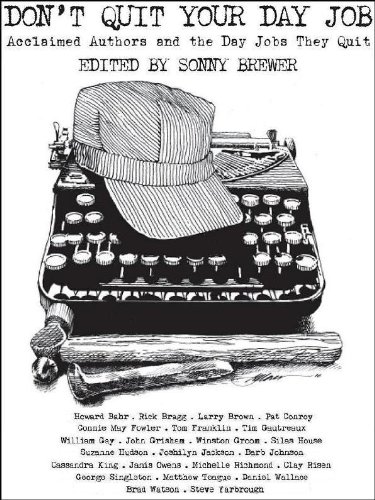 A bit of
wisdom so often given to artists and writers is the impetus behind a fine
collection of essays from MP Publishing/PGW: Don't Quit Your Day Job: Acclaimed Authors and the Day Jobs They Quit,
edited by Sonny Brewer ($24.95). When Brewer contacted authors for the essays,
he asked them how the day jobs they quit informed their art years later, and
Rick Bragg answered, "Oh, drop the pretentious literary bullshit. The
pick-and-shovel work I did informed me there was an easier way to make a damn
living." Brewer has included 23 writers in the book--Tom Franklin,
Joshilyn Jackson, George Singleton, John Grisham, to name a few--and if you've
ever marveled at author dust jacket bios ("She has been a waitress, a
long-haul trucker, a teacher and a combat photographer, and now divides her
time between Nanucket and Provence"), this is for you-- the real scoop.
Silas House was a rural mail carrier, Daniel Wallace was a vet tech, Clay Risen
worked in a call center, Tim Gatreaux was a crab scrubber, Janis Owens was and
is a kept woman (by her husband of 30 years). As Brewer says, the authors tell
good tales.
A bit of
wisdom so often given to artists and writers is the impetus behind a fine
collection of essays from MP Publishing/PGW: Don't Quit Your Day Job: Acclaimed Authors and the Day Jobs They Quit,
edited by Sonny Brewer ($24.95). When Brewer contacted authors for the essays,
he asked them how the day jobs they quit informed their art years later, and
Rick Bragg answered, "Oh, drop the pretentious literary bullshit. The
pick-and-shovel work I did informed me there was an easier way to make a damn
living." Brewer has included 23 writers in the book--Tom Franklin,
Joshilyn Jackson, George Singleton, John Grisham, to name a few--and if you've
ever marveled at author dust jacket bios ("She has been a waitress, a
long-haul trucker, a teacher and a combat photographer, and now divides her
time between Nanucket and Provence"), this is for you-- the real scoop.
Silas House was a rural mail carrier, Daniel Wallace was a vet tech, Clay Risen
worked in a call center, Tim Gatreaux was a crab scrubber, Janis Owens was and
is a kept woman (by her husband of 30 years). As Brewer says, the authors tell
good tales.
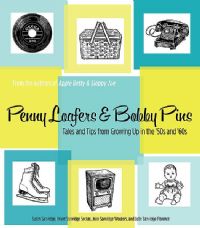 Advice of a
different sort comes from the Wisconsin Historical Society Press, which can
always be relied on to publish neat books (it's hard to top 2009's People of the Sturgeon, though). This
one is Penny Loafers and Bobby Pins:
Tales and Tips from Growing Up in the '50s and '60s by the Sandvidge
sisters--Susan, Diane, Jean and Julie ($18.95). The tales and tips are
illustrated with period photos, a few recipes and wise words from mom: "There's
still some wear in that." If you want to know about, or have forgotten,
life before pantyhose, Lucky Strikes, autograph books or TV shows like Sky King, this book will explain it all.
You can learn how to get bouncy '50s hair with pincurls, how to tie a scarf
like Audrey Hepburn, and how to survive long sermons or high mass. What a great
book to share with parents, siblings or children.
Advice of a
different sort comes from the Wisconsin Historical Society Press, which can
always be relied on to publish neat books (it's hard to top 2009's People of the Sturgeon, though). This
one is Penny Loafers and Bobby Pins:
Tales and Tips from Growing Up in the '50s and '60s by the Sandvidge
sisters--Susan, Diane, Jean and Julie ($18.95). The tales and tips are
illustrated with period photos, a few recipes and wise words from mom: "There's
still some wear in that." If you want to know about, or have forgotten,
life before pantyhose, Lucky Strikes, autograph books or TV shows like Sky King, this book will explain it all.
You can learn how to get bouncy '50s hair with pincurls, how to tie a scarf
like Audrey Hepburn, and how to survive long sermons or high mass. What a great
book to share with parents, siblings or children.
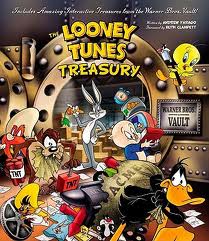 Speaking of
the '50s and '60s (and earlier), remember Looney Tunes? Running Press has just
published The Looney Tunes Treasury
by Andrew Farago ($45), and what a treasure it is. As one would expect, it's
filled with art and text, but also with inserts like a Tasmanian Devil mask, a
Tweety and Sylvester comic, a facsimile script for Bugs Bunny's "Rabbit
Hood" and much more. My favorite is the Acme Catalog from the Roadrunner
cartoons, used by Wile E. Coyote in his pursuit of the wilier bird: iron birdseed
loaded with buckshot to weigh the roadrunner down ("30% of birds have an
iron deficiency. 90% of predators have a bird deficiency."), invisible
paint, a fake hole ("Perfect for summer chases or visiting relatives.").
We need more laughs today, and this book delivers.--Marilyn Dahl
Speaking of
the '50s and '60s (and earlier), remember Looney Tunes? Running Press has just
published The Looney Tunes Treasury
by Andrew Farago ($45), and what a treasure it is. As one would expect, it's
filled with art and text, but also with inserts like a Tasmanian Devil mask, a
Tweety and Sylvester comic, a facsimile script for Bugs Bunny's "Rabbit
Hood" and much more. My favorite is the Acme Catalog from the Roadrunner
cartoons, used by Wile E. Coyote in his pursuit of the wilier bird: iron birdseed
loaded with buckshot to weigh the roadrunner down ("30% of birds have an
iron deficiency. 90% of predators have a bird deficiency."), invisible
paint, a fake hole ("Perfect for summer chases or visiting relatives.").
We need more laughs today, and this book delivers.--Marilyn Dahl

